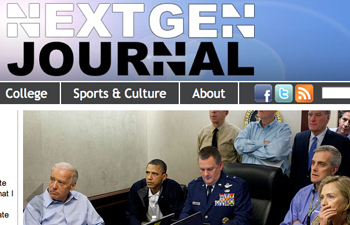Connor Toohill is attempting to break the college bubble.
Last fall, with the help of friends, Toohill launched NextGen Journal, a student-run news and commentary site, writ large. Its roughly 90 contributors are currently enrolled at colleges and universities across the U.S. and Canada.
In terms of sheer geography, Toohill has arguably filled college media’s biggest niche. At the moment, NextGen may be the only true national college news outlet by students for students.
It covers matters of interest and importance to students outside the bubble of their own campuses — “from dorm life to Darfur, and from climate change to Kid Cudi.” Recent topics under investigation and discussion on the NextGen home page ranged from Libya, Net neutrality, and campus break-dancing clubs to college graduation rates, the deficit, and Rebecca Black.

“Up until now, campus media, especially in the opinion sense, has just been localized,” said Toohill, 19, a rising sophomore at the University of Notre Dame. “There’s nothing from our generation that is influential in the national sphere. We wanted to do something that can have influence nationally, that can bring our generation into the conversation.”
The “Osama Circus”
Amid the conversations — and celebrations — that have erupted in the wake of Osama Bin Laden’s killing, NextGen has published more stories on more angles than any other student media outlet.
The site featured dispatches on student reactions at roughly two dozen schools — from West Point cadets running around in “crazy patriotic costumes and underwear” to Stanford University students who “roasted s’mores, drank beer (mostly the American variety), and chanted ‘U-S-A U-S-A!’”
It debated the merits of the country’s celebratory mood, including a Michigan State University student who decried the “Osama circus” atmosphere and a Tulane University student who separately described the national party as “perhaps the only time that I’ve felt proud to call myself a young college student.”
NextGen also reflected on the meaning of the terror kingpin’s death for current students who were in grade school when 9/11 occurred. It gauged the impact of the military strike on the 2012 presidential election. It ran a reminder op-ed that “terrorism does not die with Osama Bin Laden.” And it discussed the growing skepticism surrounding Pakistan’s alleged ignorance of Bin Laden’s whereabouts.
Similar stories have been run throughout the professional press — but hardly any from the student perspective.
As Toohill said, “Our best pieces, our most popular pieces — whether it’s Egypt or the State of the Union or health care reform or the Super Bowl — really look at, what is the impact here for students? What is the significance for our generation? We’ve seen there is really a demand for that. Huffington Post College is sort of established as a section to cover what’s going on at college. Basically, what we’re saying is that college students deserve their own Huffington Post.”
Voices of the Next Generation
NextGen Journal began with 800 words and $20 trillion.
In early 2009, Toohill, then a 17-year-old high school senior in San Diego, came across a slew of politicians and pundits debating the impact of the growing national debt. Many of them were repeatedly imploring lawmakers and the public to think of “the next generation” when deciding what economic recovery tactics to take.
Toohill noticed one important set of voices missing from the debate. “I was kind of frustrated about the fact that everyone was talking about the next generation and what we should do for the next generation,” he said, “but there were no voices of the next generation, my generation, in the conversation.”
So Toohill spoke up. In an 800-word community essay published in the San Diego Union-Tribune, he discussed the need for federal government “fiscal responsibility” to help stave off “a crushing and unsustainable national debt.”
“At this moment, our nation is in a deep financial hole,” he wrote. “We must stop digging, making the decision to leave some aspects of energy, education and health care reform to future administrations or to the private sector… As a member of the generation that will be tasked with solving these issues and paying for these proposals, I know one thing for certain: I would much rather inherit difficult policy problems than a $20 trillion national debt.”
For weeks after the essay’s premiere, Toohill dealt with a separate indebtedness. He felt he owed it to himself and his peers to do more. “Basically, I wanted the conversation to continue,” he said. “My dream was to have many voices of our generation in the conversation — different voices, with different perspectives, on all sorts of different topics.”
The difference between Toohill and many others with similar dreams: He made his come true.
Giving Writers Independence
NextGen’s newsroom is located at the virtual nexus of Google Docs, WordPress, and a mountain of email. Most staffers have never met in person. Toohill recruited a majority of the contributors himself, after stumbling across their personal blogs or other online writings.
So far, the site’s strength is more views than news. Student opinions, in the Voices section, are published in droves, daily, an impressive feat for an enterprise that as of yet does not offer staffers money, course credit or enormous name recognition (the site’s monthly readership is 12,000 and growing).

Instead, its attraction to student writers is independence — the independence to be what staff writer Jack Fitzpatrick called “edgy and entertaining, and also to talk about any issue, no matter how controversial it is.”
This independence especially interested Heather Regen.
Growing up, Regen’s family talked about all the red-button topics she said most want to avoid in polite conversation. “To be able to hold your own at the dinner table, I really needed to know what was going on,” said Regen, a rising sophomore at Georgetown University.
One night, while eating dinner at a local pizza joint, she became embroiled in such an impassioned debate with her brother about Iraq and North Korea that two gentlemen at a nearby table were drawn in as de facto judges.
In their estimation, she won.
Last fall, she joined NextGen, writing at first about college admissions, airport scanners, Four Loko, the State of the Union, and the rise in college textbook renting and downloading.
One Word: Egypt
Yet, as she said, “What made me most excited about the entire process of pitching articles and writing them and keeping up with the world and being a part of the news rather than just reading the news was one word: Egypt.”
At the very start of the Arab uprisings, Regen’s international relations professor told her it was an incredibly exciting time to be alive “because history is happening right in front of you.”
She laughed off the comment at the time, considering it an idealistic professor’s love of her subject matter. And then Tunisia’s government fell; unrest escalated in Yemen; and citizens took to the streets of Cairo.
As Regen recalled, “I went back to her during office hours and said, ‘You know, when you first talked about Egypt, I thought you were just being nostalgic for your college years and how exciting they were. But I believe you now. I really do think we are living through a time when history is being made.’ Being able to report the news while that’s happening is something that’s incredibly gratifying.”
In early February, she wrote a review of the Egyptian protests for NextGen, arguing that the large, disaffected youth population caused the revolution to spread much more than new media. As she declared in the headline, “In Egypt, Forget Twitter — Look to Our Generation.” Five days after the piece was posted, Andrew Revkin linked to it in a blog he maintains for the New York Times.
“For college papers, most of what you write about focuses on the university itself,” Regen said. “Whereas NextGen Journal gives me a way to address more global issues, address issues that are affecting any college student, instead of college students specific to one university. I see it as an outlet to break the college bubble.”
Dan Reimold is an assistant professor of journalism at the University of Tampa. He writes and presents frequently on the campus press and maintains the daily blog College Media Matters, affiliated with the Associated Collegiate Press. His first book on a major modern college media trend, Sex and the University: Celebrity, Controversy, and a Student Journalism Revolution, was published this past fall by Rutgers University Press.

